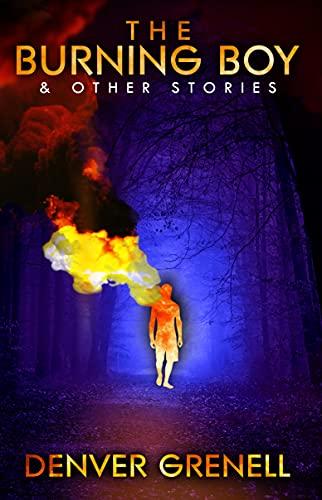You are here
Home › Books › A Dark Lushness Reverberates Through Denver Grenell's The Burning Boy And Other Stories ›A Dark Lushness Reverberates Through Denver Grenell's The Burning Boy And Other Stories
FTC Statement: Reviewers are frequently provided by the publisher/production company with a copy of the material being reviewed.The opinions published are solely those of the respective reviewers and may not reflect the opinions of CriticalBlast.com or its management.
As an Amazon Associate, we earn from qualifying purchases. (This is a legal requirement, as apparently some sites advertise for Amazon for free. Yes, that's sarcasm.)

"My devil had been long caged, he came out roaring." --Robert Louis Stevenson, The Strange Case of Dr. Jekyll and Mr. Hyde
For decades in both its celluloid and written form, horror has often been perceived, correctly in many instances, of being stagnant and insular, a genre concerned more with the spoils of imitation--box office results and best-seller lists--than innovation. No sooner is a cinematic sub-style such as the slasher film introduced than it becomes copied to the point of cliché and even parody; likewise, the emergence of that literary titan Stephen King in the 1970's has single-handedly crystallized in the mind of the general public what horror fiction is supposed to be, whether it is or not. If truth is the first casualty of war, then originality is very nearly the first casualty of producers and publishers churning out homogenized, cookie-cutter product in the name of profit. Not all creators, however, are satisfied with merely standing on the shoulders of their predecessors. They unabashedly see and interpret the horror landscape in new and exciting ways.
Denver Grenell is one such writer. Weaned on a youthful diet of horror flicks and Fangoria magazine, the New Zealander's unique and unflinching work has appeared in various anthologies from DarkLit Press, Crystal Lake Publishing, Black Hare Press, Bloodrites Horror as well as on Hawk & Cleaver's The Other Stories podcast. Now, Beware The Moon Publishing releases The Burning Boy and Other Stories, a fifteen-story compilation of Grenell's short fiction that highlights his singular approach to the modern horror yarn.
The tome's opener, 'The Offering', finds teenaged Cara learning about her secretive grandfather's scars, and the terrifying meaning contained within his mystical journal, while three other teens testing a local urban legend about a cursed staircase discover the terrifying truth once they tread on 'The Thirteenth Step'. A young man meets his dream girl at a Halloween party and soon learns that sacrifice is a consequence of desire in 'Lilith'. 'Ichor' concerns two test subjects granted superheroic abilities in a heavily-guarded governmental facility. A lonely man mourning those he once knew at a cemetery turns out to be more sinister than he first appears in 'The Grave', while a patient phantom awaits the perfect time to give a 'Last Kiss' to the philanderer responsible for her earthly demise.
The volume's second half kicks off with a bang as a would-be classroom killer unexpectedly meets his match in his high school's 'Corridor'. A dictatorial advertising director finds herself on the receiving end of a gypsy curse after firing an assistant who failed to understand how she wants her coffee in 'Black, One Sugar'. Two back-to-back transportation tales come next: a nervous man's maiden train ride through Wellington's subterranean mountain 'Tunnel' turns into a struggle for survival once a natural (or is it an unnatural?) disaster strikes, while an appreciated taste for late-'90's electronic music livens up 'The Bus', a clever and unique take on the vampire that delivers genuine climactic shocks. A pair of pieces share connections to other stories, showing that Grenell's short fiction may be fragments of a larger personal mosaic--'Rectify', a futuristic extension of the sci-fi possibilities presented in 'Ichor', centers on a fugitive time traveler who literally takes himself out, while the concluding 'I See You' is an inventive sequel to 'The Grave' that shifts perspectives and gives vengeful closure to that earlier tale.
Grenell's work is a magnificent showcase of compact, surgical craft; each story is scalpel-precise, sharp enough to slice straight to the emotional core and allow readers to swiftly binge several of the short yarns in a single sitting. Yet that fierce economy of words cuts both ways: brevity may be the soul of wit, but some pieces feel incomplete, the sketchiest of outlines rather than the intricate Rembrandt masterpieces their creator envisioned. That briefness begets a certain frustration, but only because of Grenell's potent literary skill: his writing is so clear and vivid, the situations so alluring to the mind's eye, that we want more, and cannot help but be disappointed when some of the tales seem to stop prematurely.
That said, there's far more to love in The Burning Boy than not; Grenell's dialogue consistently rings true to the ear, and a dark lushness reverberates through his prose: 'A bunch of red roses hung from the man's right hand like a splash of blood from an open vein' reads one poetic passage from 'The Grave', and such imaginative invocations are not isolated incidents. True, also, is the fact that Grenell's creative finger lies on the pulse of contemporary societal issues, and he wisely utilizes them to exacting, frightful effect rather than for cheap thrills, or worse, sensationalist exploitation. There's the ecological undercurrent of 'Lilith', the school shooting scenario central to 'Corridor', the devastating drawbacks of youthful peer pressure displayed in 'The Thirteenth Step' and the book's titular tale. It's likewise an example of his innovative spirit that little in the way of tried-and-true horror scenarios arise: few of the genre's heavy-hitting stock monsters such as vampires or zombies appear, and when they do Grenell cleverly inverts, subverts or outright demolishes their tiresome familiarity. Themes and plots revolve instead around the wickedness that humanity perpetrates, upon nature and upon itself, and to that end three stories deserve special recognition.
When a young man badgered by his mother about having children finds a mysterious infant on his doorstep it begins a macabre metamorphosis in 'Cherub', a hallucinogenic dose of body horror. The murdered lover who tells her tale, 'In Comes The Tide', similarly undergoes her own grisly transformation once her body is dumped overboard. What makes this story stunning is its dual, entwined narrative: one of the protagonist's post mortem undersea journey, and the heartbreaking revelatory thread detailing how she came to be there.
Yet it is the collection's title story, 'The Burning Boy', that evokes the starkest chills. A trio of teenage delinquents responsible for the accidental Guy Fawkes Night immolation of a schoolmate become the victims of his vengeful apparition on the crime's bleak anniversary. Palpable with dread, the fable here frightens precisely because of its realistic manner and the earnest voice that tells the tale.
In an often stale and set-in-its-ways genre, Grenell strives for, and achieves, that rarest of accomplishments--originality--and it's for that reason that I recommend The Burning Boy and Other Stories and give it a perfectly respectable 3.5 (out of 5) on my Fang Scale. Any horror collection that references The Chemical Brothers' 'Out of Control' is worthy of my attention and yours. Curl up with it one lazy afternoon. You won't regret it.


